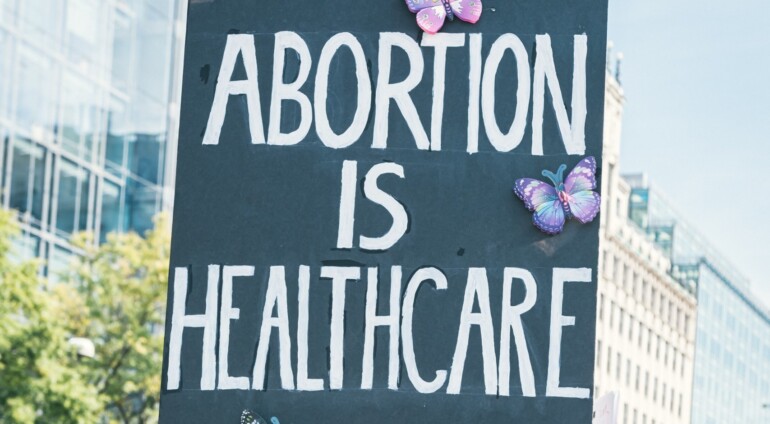On Friday, June 24, the United States Supreme Court overturned Roe v. Wade — the 1973 landmark decision which guaranteed federal constitutional protections of abortion rights — in a 5-4 vote. An unprecedented decision made in the wake of rising tensions following a leaked draft opinion on May 2, stating that the SCOTUS had voted to overturn the legislation.
What’s more, the Court additionally moved to overturn the controversial 1992 Planned Parenthood v. Casey ruling as well. “We hold that Roe and Casey must be overruled,” Justice Alito wrote in the leaked “Opinion of the Court.” “It is time to heed the Constitution and return the issue of abortion to the people’s elected representatives.”
Today, the Supreme Court not only reversed nearly 50 years of precedent, it relegated the most intensely personal decision someone can make to the whims of politicians and ideologues—attacking the essential freedoms of millions of Americans.
— Barack Obama (@BarackObama) June 24, 2022
The ruling cements the swelling fear that the Court would abandon logic and legal protections in order to entrust abortion rights to the hands of each state. While this definitive stance holds reproductive rights and bodily autonomy in its grip, it does not diminish the alternative avenues Americans might navigate to receive care and buck against this systemic decision.
View this post on Instagram
What could potentially happen now that it has been overturned? Here’s what we know:
The Guttmacher Institute, a leading research and policy organization committed to advancing sexual and reproductive health and rights in the United States, states that in the aftermath of Roe, 26 states are certain or likely to ban abortion. With 13 of those states implementing their bans as soon as next month.
Across the country, many state leaders are publicly stating their Roe-related intentions for their jurisdiction. For example, Illinois Governor J.B. Pritzker, who has adamantly railed against the overturn since the draft opinion broke over a month ago; now promising to “not turn back the clock” in regards to the unparalleled federal decision.
To the right wing officeholders who today are cheering the Supreme Court’s ruling: GET YOUR IRON BOOT OFF WOMEN’S NECKS! pic.twitter.com/SZVG6w5V3z
— Governor JB Pritzker (@GovPritzker) June 24, 2022
Thirteen states have trigger laws in place. Now that Roe is overturned, antiabortion laws will likely be imminent here:
- Arkansas
- Idaho
- Kentucky
- Louisiana
- Mississippi
- Missouri
- North Dakota
- Oklahoma
- South Dakota
- Tennessee
- Texas
- Utah
- Wyoming
Five other states have a decades-old abortion ban that could be enforced again:
- Alabama
- Arizona
- Michigan
- West Virginia
- Wisconsin
14 states could restrict abortion to 22 weeks or possibly earlier:
- Alabama
- Arizona
- Florida
- Georgia
- Indiana
- Iowa
- Kansas
- Montana
- Nebraska
- North Carolina
- Ohio
- South Carolina
- West Virginia
- Wisconsin
California, Maine, Illinois, New York, Washington and Oregon have some of the best reproductive rights laws in the U.S., and have expanded access to reproductive health in recent years.
Yet, on a non-governmental level, there are organizations and companies already laying the groundwork to protect their employees and those they serve. The Walt Disney Co., for example, announced they would “cover employee travel expenses for abortions in light of the Supreme Court’s decision to strike down Roe v. Wade,” as reported by The Washington Post.
The Walt Disney Co. said Friday it would cover employee travel expenses for abortions in light of the Supreme Court’s decision to strike down Roe v. Wade, the latest corporate giant to make the move. https://t.co/9QZIjMEj2B
— The Washington Post (@washingtonpost) June 24, 2022
In the gap between federal mandates and inner-organization policy, everyday American lives will fundamentally change — bringing citizen-led action to the forefront once again.
Feeling fearful of what’s next? Here are some steps you can take counteract the decision:
View this post on Instagram
“Roe alone was never enough to protect abortion rights and access,” said Dr. Herminia Palacio, Guttmacher Institute President and CEO, at the time of the Court draft opinion leak. “We know from decades of research that the impact will fall hardest on those who already struggle to access health care, including abortion.”
BREAKING: The Supreme Court just overturned Roe v. Wade, ending our constitutional right to abortion. We know you may be feeling a lot of things right now — hurt, anger, confusion. Whatever you feel is OK. We’re here with you — and we’ll never stop fighting for you.
— Planned Parenthood (@PPFA) June 24, 2022
More from Better:
- ‘Together, We Are Making Big Waves’: Pioneering Marine Biologist and National Geographic Explorer Sylvia Earle Says It’s Not Too Late to Save Our Oceans
- 6 No-Cost Ways to Make Your Money Support Your Environmental Values
- Powerful Marin Women Making a Positive Impact and Pushing Boundaries

Margaret Smith is a Chicago-based writer and editor with a passion for socio-political storytelling about their community. They are a graduate of Columbia College Chicago.

